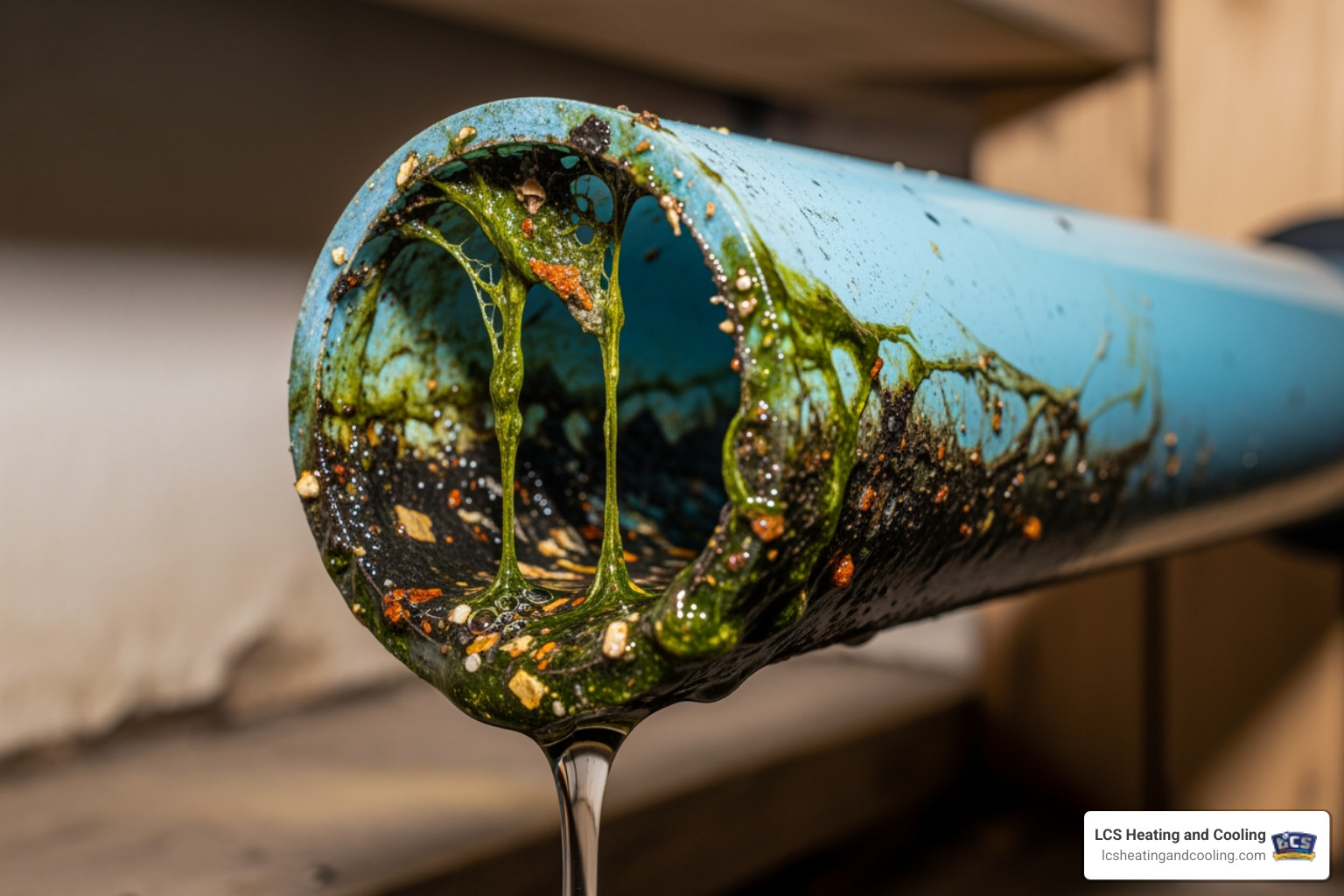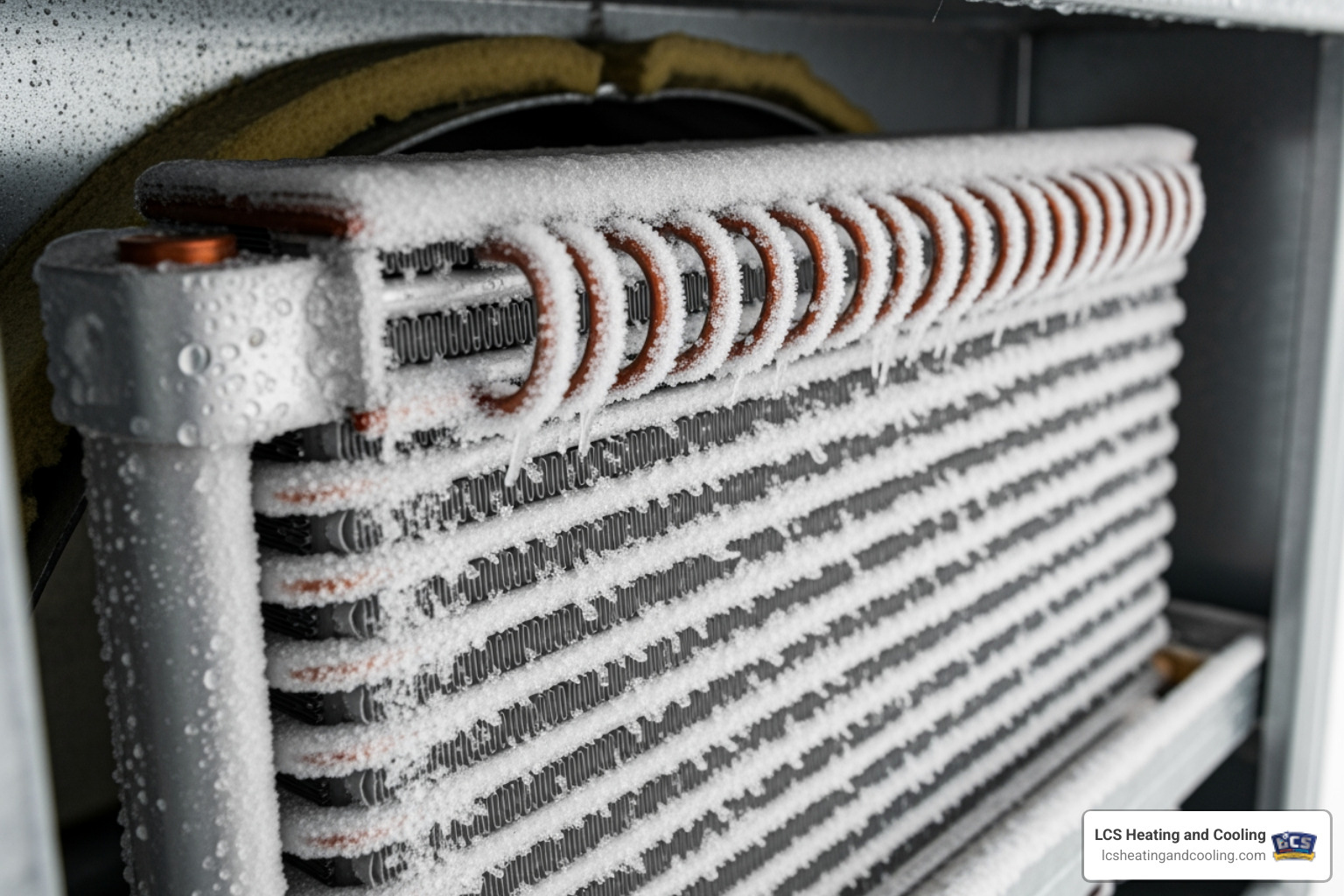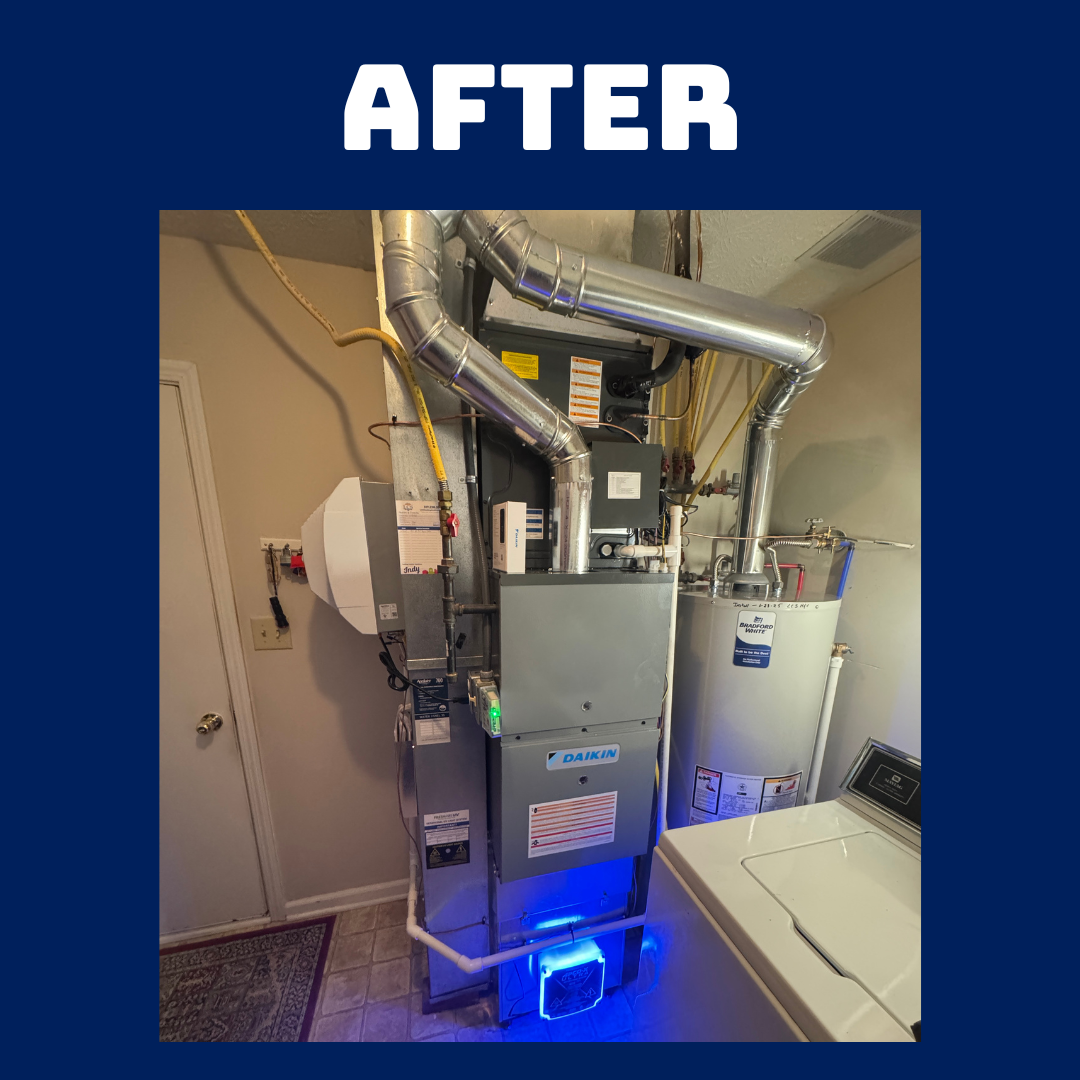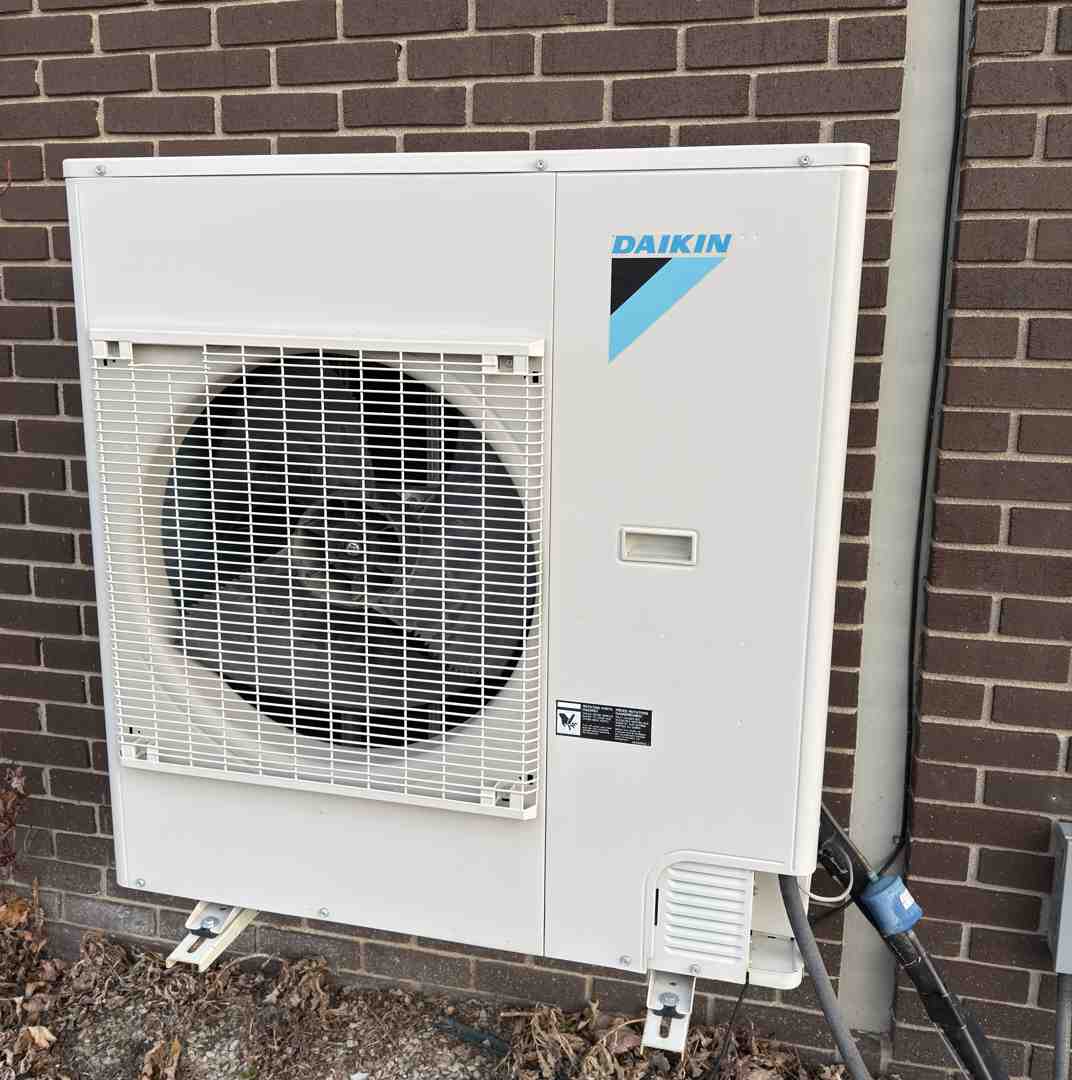Why Your HVAC is Leaking Water in Greenwood: Causes and Solutions
What Causes an HVAC Leaking Water in Greenwood IN
Dealing with an hvac leaking water in greenwood in is a common problem during our humid Indiana summers. Water pooling around your indoor unit usually signals an issue with the condensate drainage system. This can include a clogged drain line, a frozen evaporator coil, or damaged components like the drain pan. While some basic troubleshooting is possible, professional repair is often the safest and most effective solution.
Common Causes of HVAC Water Leaks:
- Clogged condensate drain line - algae, mold, or debris blocks the drain pipe
- Frozen evaporator coil - caused by dirty air filters or low refrigerant
- Damaged drain pan or pump - rust, cracks, or mechanical failure
- Blocked airflow - restricts heat absorption and causes freezing
For expert HVAC service throughout Indianapolis, visit our HVAC services page. If you need immediate help with a leaking system, contact our Greenwood team for fast, reliable repair.
Your air conditioner removes moisture from the air as it cools your home. This condensation drips from the evaporator coil into a drain pan and flows outside through a PVC drain line. When this process is disrupted by a clog, freeze-up, or equipment failure, water backs up and leaks into your home. Understanding these causes helps you know when to troubleshoot and when to call a professional.

1. Clogged Condensate Drain Line
A clogged condensate drain line is the most frequent reason for an hvac leaking water in greenwood in. Your AC removes gallons of moisture from the air, and if the drain line gets blocked, that water ends up in a puddle on your floor. Signs of a clog include water near the indoor unit, a musty smell from vents, or your system shutting off unexpectedly.

The condensate drain line is a PVC pipe that channels moisture from your indoor unit to the outside. The dark, damp environment inside this pipe is a perfect breeding ground for algae and mold, which can grow into a slimy blockage. Dust and debris can also contribute to forming a stubborn clog.
How a Clogged Drain Line Causes a Leak
Normally, warm, humid air passes over the cold evaporator coil, causing moisture to condense and drip into the condensate pan below. Gravity then guides the water through the drain line and safely outside. When a clog forms, water backs up in the pan. As your AC continues to run, the pan overflows, spilling water onto your floor. Many modern systems have a safety float switch that shuts off the AC to prevent flooding, which is a clear sign of a drainage problem.
How to Clear a Clogged Drain Line
If you're comfortable with some DIY, you may be able to clear the clog yourself. Always prioritize safety when working near your HVAC unit.
- Turn Off Power: Shut off the power to your AC unit at the circuit breaker to prevent electrical shock.
- Clean the Pan: Locate the condensate pan under the indoor unit. Use a wet-dry vacuum or towels to remove any standing water, then clean the pan with soap and water or a vinegar solution to remove slime and mold.
- Access the Drain Line: Find the PVC drain line, which usually has a T-shaped access tee with a cap. Remove the cap.
- Clear the Clog: Use a wet-dry vacuum on the outdoor end of the drain line to suction out the blockage. Alternatively, you can gently use a thin, flexible brush to break up debris from the access point.
- Flush the Line: Pour one cup of distilled white vinegar into the access point to kill remaining algae and mold. Let it sit for 30 minutes, then flush with water to ensure it flows freely.
Afterward, restore power and test the system. If water is still pooling or you're not comfortable with these steps, don't hesitate to contact our Greenwood team. Our NATE-certified technicians have specialized tools to clear even the most stubborn clogs safely and effectively.
2. Frozen Evaporator Coil
If you notice your evaporator coil is covered in a layer of ice, you're likely about to have an hvac leaking water in greenwood in problem. As that ice melts, it can overwhelm your condensate pan and cause a significant leak. A frozen coil is typically caused by one of two issues: restricted airflow or low refrigerant.

In both scenarios, the coil gets too cold, causing moisture in the air to freeze on its surface. When the AC cycles off, the melting ice produces more water than the drain system can handle, leading to an overflow. One of these causes is easily preventable with routine maintenance.
How a Dirty Air Filter Contributes to an HVAC Leaking Water in Greenwood, IN
A clogged air filter is a primary cause of restricted airflow. Your system's evaporator coil needs a constant flow of warm air to absorb heat properly. When a dirty filter blocks this air, the coil's temperature plummets below freezing. Moisture from the air then freezes onto the coil, forming a block of ice that will eventually melt and overwhelm the drain pan.
Signs of a dirty filter include reduced cooling, higher energy bills, and a visible layer of dust on the filter itself. The fix is simple: check your air filter monthly and replace it every 1-3 months, or more often if you have pets or allergies. This small task is crucial for preventing frozen coils and the leaks that follow.
How Low Refrigerant Leads to Freezing
Refrigerant is the substance that allows your AC to cool your home. Your system is designed to operate with a precise amount, and a leak can throw the entire system out of balance. When refrigerant levels drop, the pressure in the system also drops, causing the evaporator coil to become excessively cold and freeze over.
As the ice builds up, your home won't cool effectively. When the system cycles off, the melting ice creates a large volume of water that overflows the condensate pan, resulting in a leak. You might suspect low refrigerant if your AC runs constantly but doesn't cool well, or if you hear a hissing sound near the unit.
Do not attempt to handle refrigerant yourself. It is a hazardous material that requires EPA-certified professionals to manage safely. If you suspect a refrigerant leak, contact our Greenwood team immediately. Our NATE-certified technicians can locate and repair the leak, then recharge your system to the correct specifications, restoring your home's comfort.
3. Damaged Condensate System Components
Even with a clear drain line and a frost-free coil, you can still experience an hvac leaking water in greenwood in if parts of the condensate system itself are damaged. Components like the condensate pan and pump are subject to wear and tear over time, especially in older systems.

These parts are constantly exposed to moisture, which can lead to corrosion, cracks, and mechanical failure. When a component fails, water escapes where it shouldn't, and you'll notice a puddle forming around your indoor unit.
The Role of the Condensate Pan and Pump
The condensate pan, located under the evaporator coil, catches water. Over time, metal pans can rust through, creating drain pan holes that let water drip onto your floor. Plastic pans can become brittle and develop cracks from age or stress, causing leaks.
For systems installed in basements or other areas without a gravity drain, a condensate pump is used to move this water outside. These pumps can fail due to motor burnout, clogs, or general wear. A failed pump causes water backup in the condensate pan, which eventually overflows.
Many pumps have a safety float switch to shut off the AC during a failure, but this switch can also malfunction. If the switch fails to detect rising water, the system will continue to run and spill water, potentially causing significant damage before the problem is noticed.
If you suspect your condensate pan is rusted or cracked, or if your condensate pump isn't working, it's time to call a professional. These components must be replaced correctly to prevent ongoing leaks and protect your Greenwood home from water damage.
What to Do: Homeowner Troubleshooting vs. Professional Repair
Finding an hvac leaking water in greenwood in can be stressful, but a calm and methodical approach can prevent further damage and help you determine your next steps. The key is to know the difference between a simple DIY fix and a problem that requires a professional.
Some leaks stem from straightforward issues, like a clogged drain line you can clear yourself. Others involve complex components like refrigerant or electrical systems that are unsafe to handle without proper training and tools.
Steps to Take for an HVAC Leaking Water in Greenwood, IN
When you spot a leak, act quickly to prevent damage:
- Turn Off the AC: Switch your thermostat to "Off" and, for safety, turn off the power to the indoor air handler at the circuit breaker.
- Clean Up Water: Use towels or a wet-dry vacuum to remove all standing water to protect your floors, walls, and belongings.
- Perform a Quick Inspection: Check for the most common culprits. Is the air filter dirty? Is the condensate pan cracked or overflowing? These clues can help you identify the source.
- Try a Simple Fix (If Comfortable): If the pan is overflowing but intact, the drain line is likely clogged. You can attempt to clear it using a wet-dry vac or a vinegar flush. A new, clean air filter can solve freezing issues caused by restricted airflow.
Note what you find during your inspection, as this information is valuable if you need to call a professional.
When to Call an HVAC Professional
Knowing when to call for help is a key part of smart homeownership. Certain issues are dangerous or too complex for DIY repair.
- Refrigerant Leaks: Always call a professional. Refrigerant is a controlled substance, and leaks must be located and sealed by a certified technician before the system is recharged.
- Persistent Coil Freezing: If your coils keep freezing even with a clean filter, it points to a deeper issue like a refrigerant leak or a failing blower motor that requires professional diagnosis.
- Electrical Issues: For your safety, never attempt to fix problems with wiring, float switches, or condensate pumps. Water and electricity are a dangerous mix.
- Damaged Components: Replacing a rusted drain pan or a failed condensate pump is a job best left to a professional to ensure it's done correctly and safely.
- If You're Unsure: If you've tried basic troubleshooting and the leak continues, it's time for a comprehensive system inspection. Our technicians can perform a thorough diagnostic to find and fix the root cause correctly the first time.
Our team at LCS Heating and Cooling is here to help. Contact us for expert HVAC repair in Greenwood, IN whenever you need professional assistance.
The Dangers of Ignoring an HVAC Leak
That small puddle around your indoor unit may seem like a minor annoyance, but ignoring an hvac leaking water in greenwood in can lead to serious problems for your home, health, and budget. What starts as a simple fix can quickly escalate into a costly restoration project.
Potential Damage and Health Risks
Letting a leak continue puts your property and well-being at risk. The most immediate threat is water damage. Persistent moisture can warp flooring, stain drywall, and compromise subflooring and structural supports.
Beyond what you can see, the constant dampness creates the perfect environment for mold and mildew growth. Mold releases spores into your air, which can cause significant health risks. Family members may experience an increase in allergies, asthma attacks, or other respiratory issues. These health problems are especially concerning for children, the elderly, and anyone with a compromised immune system.
There is also a serious electrical hazard. If water reaches electrical components in your HVAC system, it can cause short circuits, system failure, and even create a fire risk.
Finally, a leaking system is an inefficient one. Whether it's from frozen coils or frequent shutdowns, this system efficiency loss leads to higher energy bills and shortens the lifespan of your equipment. Addressing a leak promptly is essential for protecting your home, your family's health, and your finances.
Frequently Asked Questions about HVAC Water Leaks
We hear the same concerns from Greenwood homeowners all the time when they're dealing with water leaks. Here are the questions that come up most often, along with honest answers from our team.
Why is regular AC maintenance important for preventing water leaks?
Regular AC maintenance is the best way to prevent water leaks. During a tune-up, a technician performs key preventative tasks that stop leaks before they start. This includes cleaning the evaporator coils, flushing the condensate drain line to prevent clogs, inspecting the drain pan for cracks or rust, and checking refrigerant levels to prevent coil freeze-ups. Catching these small issues early saves you from the cost and stress of an emergency hvac leaking water in greenwood in and the potential for water damage. Regular tune-ups also improve efficiency and extend the life of your system.
What is the difference between an AC leak and a high-efficiency furnace leak?
This is a great question, as both can cause water leaks but for different reasons and at different times of the year.
- An AC leak occurs in the summer. It's condensation created when your air conditioner removes humidity from the air. The leak happens when this condensation can't drain properly due to a clog, frozen coil, or damaged pan.
- A high-efficiency furnace leak happens in the winter. These furnaces are so efficient that they produce condensation as a byproduct of heating. A leak occurs if the furnace's own drain line clogs or freezes.
If you see water in the summer, the problem is your AC. If it's winter, your high-efficiency furnace is the likely culprit.
Can a minor HVAC water leak fix itself?
No, an HVAC water leak will not fix itself. A leak might seem to stop temporarily, but the underlying problem—like a partial clog, a small crack, or low refrigerant—is still there and will only get worse. Ignoring a minor drip can lead to significant water damage, mold growth, and a more expensive repair down the line. It's always best to address any sign of an hvac leaking water in greenwood in as soon as you notice it. A quick call to a professional can prevent a much bigger headache later.
Your Greenwood Solution for HVAC Leaks
When you're dealing with an hvac leaking water in greenwood in, you deserve more than just a quick patch job—you need a partner who truly understands our Indiana climate and stands behind their work. That's exactly what you'll find at LCS Heating and Cooling.
We've built our reputation in Greenwood on something we call our 7-Star Concierge Service, and it's not just a fancy name. It means when you call us, we show up when we say we will. It means we explain what's happening with your system in plain English, not technical jargon. It means we respect your time, your home, and your budget. Most importantly, it means we're focused on lasting comfort solutions that actually fix the problem, not temporary Band-Aids that leave you calling us back in a month.
Our NATE-certified technicians have seen it all—from stubborn algae clogs in condensate lines to mysterious refrigerant leaks that other companies missed. Whether your drain pan has rusted through, your evaporator coil keeps freezing, or you're simply not sure what's causing that puddle around your air handler, we have the expertise to diagnose it accurately and repair it properly the first time.
Your home is your sanctuary, and a water leak shouldn't compromise that. Don't spend another day worrying about water damage, mold growth, or whether your AC will make it through the summer. Our team is ready to help you get back to enjoying reliable, worry-free cooling.
Contact us for expert HVAC repair in Greenwood, IN and experience the difference that true professionalism and care can make.

